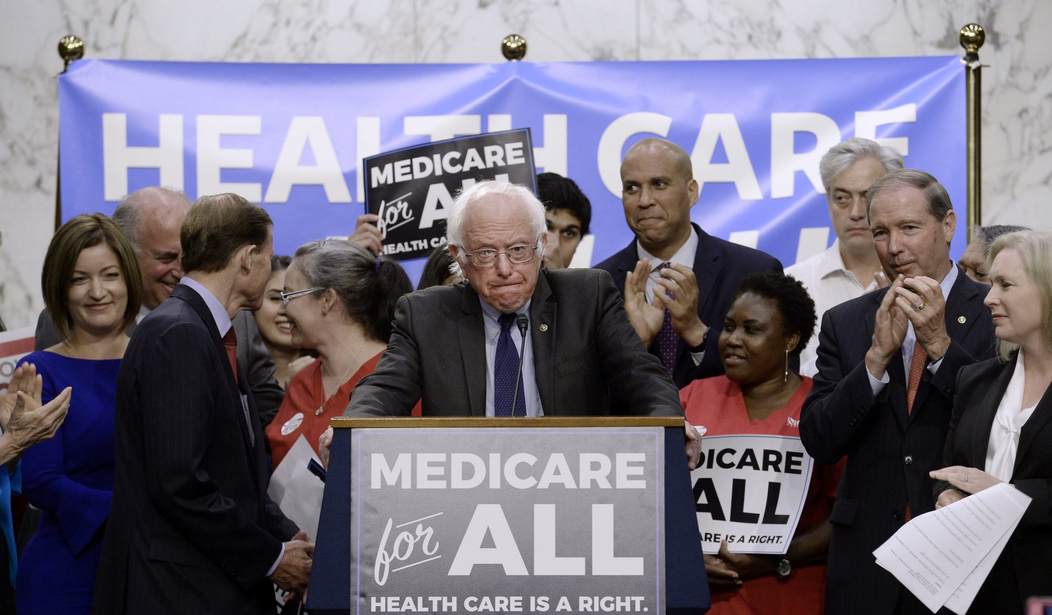Medicare for All is the left’s newest branding strategy for socialized medicine in the United States. Promoted by several Democratic presidential candidates and introduced by Senator Bernie Sanders of Vermont, its backers say it would improve the cost and quality of health care in America.
With a compliant media touting its alleged benefits, Medicare for All holds majority support among the American public. Once its details – such as elimination of private health insurance – are exposed, that support drops, according to the Kaiser Family Foundation.
Kaiser’s results should guide conservative arguments against socialized health care. Facts should be easily personalized by the public, and arguments should be based upon data which is intellectually credible and emotionally engaging.
In other words: it’s time for a lot of math.
America spends a lot more.
The first step to refuting Medicare for All is to admit that we spend too much on health care. America spends more than $9,000 per person per year on health care, according to a 2017 study of OECD nations’ health care spending. That’s more than twice the OECD average. Our mixed health care outcomes aren’t worth spending so much more money than other nations, though part of the reason that we are far behind the norm in some areas is less about health care and more about lifestyle choices like unhealthy eating and little exercise.
Some alleged measures of our worse outcomes are questionable. Our shorter lifespans compared to other first-world nations, for example, can partially be attributed to overall lower outcomes, higher suicide rates, and drug overdoses. Similarly, our infant mortality rate is often not compared apples to apples with other nations because there is no consistent definition of when a baby is recorded as born.
But, as a nation, we really do need to improve our health care and lifestyle outcomes if we are going to spend so much.
Contrary to what we see on cable TV and Twitter, acknowledging these shortcomings doesn’t diminish the validity of opposition to Medicare for All. Facts are facts, even when we don’t like them. Acknowledging shortcomings also builds factual and emotional credibility with people whose opinions conservatives want to change.
Medicare for All would cost a lot of money.
If the U.S. spends too much now, Medicare for All would make that far, far worse. A thorough and widely-cited research paper issued by Mercatus Center’s Charles Blahous proves this. A former Social Security trustee, Blahous concluded that the projected costs of Medicare for All from its implementation in 2022 over the first 10 years of its existence would add at least $32.6 trillion in federal costs – “and most likely substantially more,” Blahous told me in an e-mail.
For context, that’s nearly $10,000 in annual tax increases per American per year for 10 years. Much of this is due to projected increased usage of health care resources, as happens when people have less skin in the game. (Universal coverage is one of the many touted benefits of socialized medicine.)
Blahous concluded in his paper, and clarified in e-mailed comments, that there would be some savings under Medicare for All. For example, there would be $5.3 trillion in savings by cutting provider payments – but “the effect of cutting provider payments to this extent at the same time as increasing the demand for health services is unknown,” Blahous said. “Data from the CMS Medicare actuary indicate that cuts of this magnitude would put roughly 80% of hospitals into negative margins within the first decade.” Blahous cited the Congressional Budget Office’s expectation that “the supply of health services would decline” under a program with increased services and decreased profits, “resulting in longer wait times.”
Blahous also projected up to $1.6 trillion in administrative savings, a number he says is “aggressive” and does not account for “additional risk of improper and fraudulent Medicare payments.” According to Government Accountability Office (GAO) Director of Financial Management and Assurance Beryl Davis, “HHS estimated an improper payment amount of about $48 billion for Medicare.” Davis noted that this number “is about 7% of the $660 billion in payments that were made.”
Medicare’s high improper payments and fraud vulnerabilities impact the actual administrative savings which would take place under a socialized health care system. Davis’ colleague John Dicken, who directs GAO’s work on public health and private markets, guided me to a 2014 GAO report which concluded that private insurance companies’ non-claims costs (read: overhead) in 2011 and 2012, as defined in the Affordable Care Act, was 12 percent.
Sanders claimed in 2017 that Medicare’s overhead was just two percent, but a) insurance companies do far more than Medicare in terms of accountability, b) Medicare shares overhead with other programs, c) insurance companies pay taxes that Medicare does not, and d) Medicare’s aforementioned administrative vulnerabilities are whitewashed under Sanders’ claim.
Medicare for All requires higher taxes.
The Manhattan Institute’s Brian Riedl is a nonpartisan critic of our bipartisan tendency to overspend. At The Daily Beast in 2018 and more recently on Twitter, he used Blahous’ report to gut the idea that Medicare for All would end up with lower per-person spending. His argument comes in two points:
First, both Blahous and Riedl noted that no Medicare For All plan has been presented with a funding mechanism. To quote an e-mail Riedl sent me this week:
Medicare-For-All advocates promise that family health premiums would just convert to taxes, and would cost less overall to the typical family. Yet no Medicare-For-All plan has included any tax mechanism whatsoever, so the claim that the taxes would be cheaper for families is totally baseless.
Second, that funding mechanism would be unreasonably expensive:
Funding Medicare-For-All would likely require raising the payroll tax from 15.3% to 45% — which would bury families in taxes, even if no longer paying premiums. And 50 million Medicaid recipients already pay no premiums, so they would save nothing to offset the new taxes.
What does this mean for Americans?
Blahous said that “health insurance administrative costs would likely be lower under Medicare For All” compared to the current system. The program “would also cover the currently uninsured.” However, “these advantages…should be weighed against the downsides and trade-offs associated with Medicare For All.”
Those downsides include massive taxes. They probably include higher fraud and payment errors – meaning more of your tax dollars going to criminals. Higher taxes and more spending mean a slower-growing economy. Our national debt would skyrocket, further slowing the economy and damaging our governments’ ability to respond to crises like major recessions and wars.
Perhaps worst of all from a health care standpoint, payment reductions could mean worse care.
Fewer jobs, higher taxes, worse national security, possible worse care … sounds like a loser for Medicare for All.









Join the conversation as a VIP Member